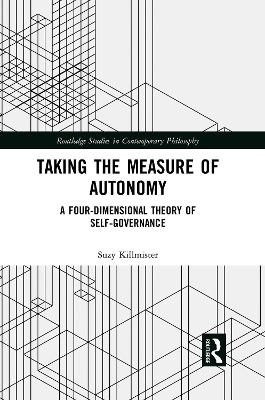
Taking the Measure of Autonomy
A Four-Dimensional Theory of Self-Governance
Seiten
2020
Routledge (Verlag)
978-0-367-59440-4 (ISBN)
Routledge (Verlag)
978-0-367-59440-4 (ISBN)
This book takes a radically different approach to the concept of autonomy. Killmister defends a theory of autonomy that is four-dimensional and constituted by what she calls self-definition, self-realisation, self-unification, and self-constitution.
This book takes a radically different approach to the concept of autonomy. Killmister defends a theory of autonomy that is four-dimensional and constituted by what she calls ‘self-definition,’ ‘self-realisation,’ ‘self-unification,’ and 'self-constitution.' While sufficiently complex to inform a full range of social applications, this four-dimensional theory is nonetheless unified through the simple idea that autonomy can be understood in terms of self-governance. The ‘self’ of self-governance occupies two distinct roles: the role of ‘personal identity’ and the role of ‘practical agency.’ In each of these roles, the self is responsible for both taking on, and then honouring, a wide range of commitments. One of the key benefits of this theory is that it provides a much richer measure not just of how autonomous an agent is, but also the shape—or degree—of her autonomy. Taking the Measure of Autonomy will be of keen interest to professional philosophers and students across social philosophy, political philosophy, ethics, and action theory who are working on autonomy.
This book takes a radically different approach to the concept of autonomy. Killmister defends a theory of autonomy that is four-dimensional and constituted by what she calls ‘self-definition,’ ‘self-realisation,’ ‘self-unification,’ and 'self-constitution.' While sufficiently complex to inform a full range of social applications, this four-dimensional theory is nonetheless unified through the simple idea that autonomy can be understood in terms of self-governance. The ‘self’ of self-governance occupies two distinct roles: the role of ‘personal identity’ and the role of ‘practical agency.’ In each of these roles, the self is responsible for both taking on, and then honouring, a wide range of commitments. One of the key benefits of this theory is that it provides a much richer measure not just of how autonomous an agent is, but also the shape—or degree—of her autonomy. Taking the Measure of Autonomy will be of keen interest to professional philosophers and students across social philosophy, political philosophy, ethics, and action theory who are working on autonomy.
Suzy Killmister is Senior Lecturer in Philosophy at Monash University, Australia
Part I: Theory
1. Introduction
2. Self-Definition
3. Self-Realisation
4. Self-Unification
5. Self-Constitution
Part II. Application
6. The Autonomy of Agents
7. Paternalism, Consent, and Moral Responsibility
8. Autonomy Under Oppression
9. Aids to Autonomy
| Erscheinungsdatum | 01.07.2020 |
|---|---|
| Reihe/Serie | Routledge Studies in Contemporary Philosophy |
| Verlagsort | London |
| Sprache | englisch |
| Maße | 152 x 229 mm |
| Gewicht | 453 g |
| Themenwelt | Geisteswissenschaften ► Philosophie ► Ethik |
| Recht / Steuern ► Allgemeines / Lexika | |
| Recht / Steuern ► EU / Internationales Recht | |
| ISBN-10 | 0-367-59440-4 / 0367594404 |
| ISBN-13 | 978-0-367-59440-4 / 9780367594404 |
| Zustand | Neuware |
| Haben Sie eine Frage zum Produkt? |
Mehr entdecken
aus dem Bereich
aus dem Bereich
unsere kollektive Verantwortung
Buch | Hardcover (2023)
wbg Theiss in Wissenschaftliche Buchgesellschaft (WBG) (Verlag)
35,00 €


